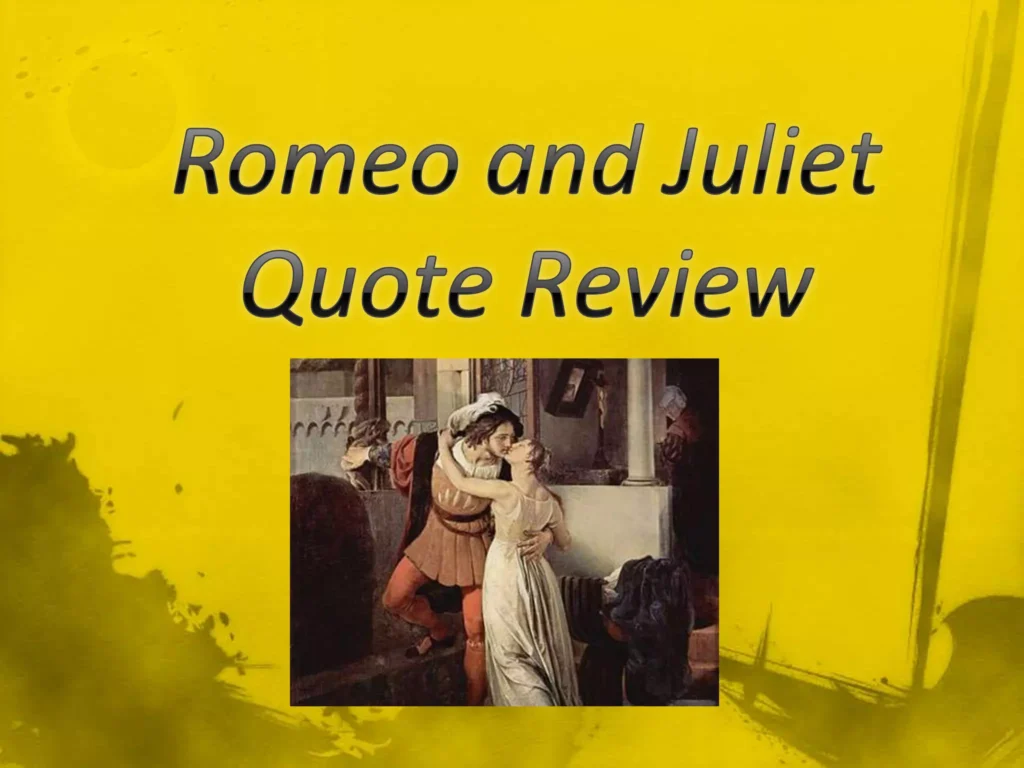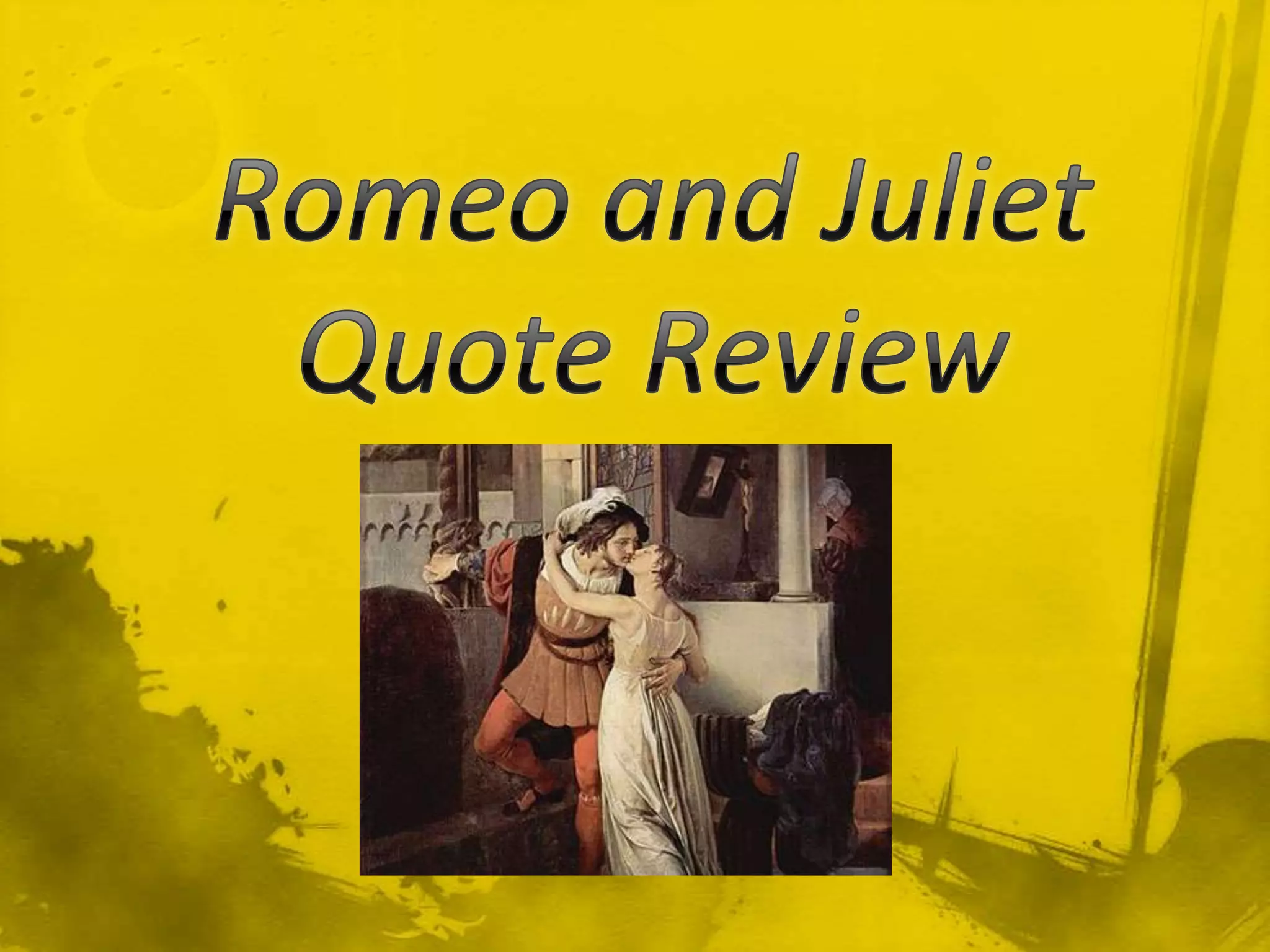
Unveiling the Timeless Power: Romeo and Juliet Quote Identification and its Enduring Legacy
William Shakespeare’s *Romeo and Juliet* is more than just a play; it’s a cultural touchstone, a source of endless fascination, and a testament to the enduring power of love, loss, and the complexities of the human condition. For centuries, audiences have been captivated by the tragic tale of the star-crossed lovers, and a crucial element of this captivation lies in the play’s unforgettable quotes. This article delves into the art of **Romeo and Juliet quote identification**, exploring some of the most iconic lines, their context, and the profound impact they continue to have on literature, language, and popular culture. We will journey through the play, examining how to recognize these memorable quotes and understand their deeper meanings.
The ability to identify quotes from *Romeo and Juliet* is a valuable skill, not just for literary scholars, but for anyone who appreciates the beauty and power of language. These quotes are frequently referenced in everyday conversation, in film, in music, and in countless other forms of artistic expression. Recognizing a quote allows us to connect with the original source, to understand its context, and to appreciate the artistry of Shakespeare’s writing. This journey into **Romeo and Juliet quote identification** will equip you with the tools to do just that.
The Language of Love and Loss: Key Quotes and Their Context
The play is rich with memorable lines. Let’s explore some of the most frequently quoted and their respective contexts within the narrative of *Romeo and Juliet*. Understanding the situations in which these words were spoken is key to appreciating their significance.
“O Romeo, Romeo! Wherefore art thou Romeo?”
This is perhaps the most famous line from the play, spoken by Juliet during the balcony scene. Contrary to popular belief, it’s not a question of where Romeo is, but rather a lament about the fact that Romeo is a Montague, her family’s enemy. The quote exemplifies Juliet’s frustration with the feud between the Montagues and the Capulets, which prevents her from openly loving Romeo. **Romeo and Juliet quote identification** often begins with this very line, a cornerstone of the play’s emotional core.
“What’s in a name? That which we call a rose / By any other word would smell as sweet.”
Following her initial exclamation, Juliet continues to muse on the arbitrary nature of names. She argues that Romeo’s family name, Montague, is irrelevant; his essence, his character, is what matters. This quote highlights the play’s central theme of the destructive power of prejudice and the barriers that societal constructs can create. It’s a powerful statement on the importance of looking beyond superficial labels. **Romeo and Juliet quote identification** is made easier by recognizing this philosophical reflection.
“But, soft! what light through yonder window breaks? / It is the east, and Juliet is the sun.”
This line, spoken by Romeo as he gazes upon Juliet, is a classic example of Shakespearean romantic language. Romeo compares Juliet to the sun, illuminating the darkness and bringing warmth and life. It’s a testament to his passionate love and adoration for her. Understanding the context of the balcony scene, and the intensity of Romeo’s feelings, is essential for effective **Romeo and Juliet quote identification**.
“My bounty is as boundless as the sea, / My love as deep; the more I give to thee, / The more I have, for both are infinite.”
Juliet’s response to Romeo’s declaration of love is equally passionate. She expresses the boundless nature of her love, comparing it to the sea’s vastness. This quote encapsulates the intensity of their feelings and the idea that love, in its purest form, can never be depleted. It’s a prime example when focusing on **Romeo and Juliet quote identification** due to its poetic beauty and direct expression of love.
“Parting is such sweet sorrow”
This quote, spoken by Juliet as she bids farewell to Romeo after their first night together, encapsulates the bittersweet nature of their separation. It acknowledges the pain of parting while also hinting at the joy of their reunion. It’s a poignant illustration of the play’s exploration of love, loss, and the ephemeral nature of happiness. This is another easy example of **Romeo and Juliet quote identification** due to its common use.
“These violent delights have violent ends”
Friar Laurence, a voice of reason and foresight, speaks these words, foreshadowing the tragic events to come. He warns that intense passions can lead to destruction. This quote serves as a subtle but significant warning, highlighting the inherent dangers of unchecked emotions. This is a powerful quote in the context of **Romeo and Juliet quote identification** because of its foreshadowing of the play’s tragic ending.
“A plague o’ both your houses!”
Mercutio’s dying curse, directed at both the Montague and Capulet families, is a powerful indictment of the feud that has driven the play’s tragedy. It expresses his frustration with the senseless violence and the destructive consequences of hatred. Recognizing this quote is critical in **Romeo and Juliet quote identification** because it marks a turning point in the play’s plot.
“For never was a story of more woe / Than this of Juliet and her Romeo.”
The Prince’s final words, summarizing the play’s tragic outcome. This couplet reinforces the devastating consequences of the feud and highlights the enduring power of the lovers’ story. This quote is, of course, a key element in **Romeo and Juliet quote identification** as the play concludes.
Strategies for Effective Romeo and Juliet Quote Identification
Identifying quotes from *Romeo and Juliet* can be surprisingly easy with a few simple strategies. The key is to familiarize yourself with the play’s language, themes, and characters. Here are some helpful tips:
- Read the Play: The most effective way to learn the quotes is to read the play itself. Pay attention to the dialogue and note the key phrases and expressions.
- Watch Performances: Watching stage productions or film adaptations of *Romeo and Juliet* can help you visualize the scenes and associate the quotes with specific characters and moments.
- Utilize Online Resources: Websites like SparkNotes, Shmoop, and the Folger Shakespeare Library offer comprehensive analyses of the play, including lists of important quotes and their meanings. These resources assist in **Romeo and Juliet quote identification** by providing context.
- Focus on Key Themes: Understanding the play’s central themes – love, loss, fate, family, and conflict – will help you recognize quotes that relate to these themes.
- Pay Attention to Character Voices: Each character has a distinct voice and style of speaking. Recognizing these characteristics can help you identify who is speaking a particular quote.
The Enduring Legacy of Romeo and Juliet Quotes
The quotes from *Romeo and Juliet* have permeated our language and culture, becoming embedded in our collective consciousness. They are used in everyday conversation, in literature, in film, in music, and in countless other forms of artistic expression. Their enduring popularity stems from their timeless themes, their beautiful language, and their ability to capture the complexities of the human experience. The play’s exploration of love, loss, and the destructive power of prejudice continues to resonate with audiences today. Their continued presence demonstrates the power of **Romeo and Juliet quote identification**.
The play’s phrases are often used to express romantic sentiments, to lament lost love, or to reflect on the tragic consequences of conflict. They serve as a shorthand for complex emotions and situations, allowing us to connect with the play’s themes on a deeper level. The consistent use of these quotes helps with effective **Romeo and Juliet quote identification**.
Shakespeare’s words have also inspired countless works of art, music, and literature. The play has been adapted into numerous films, operas, ballets, and musicals. The enduring legacy of *Romeo and Juliet* is a testament to the power of storytelling and the enduring appeal of its themes.
By understanding the play’s themes, characters, and language, you can enhance your ability to identify these lines and appreciate their beauty and power. Effective **Romeo and Juliet quote identification** allows us to connect with the story and the emotions it evokes. The ability to identify and understand these quotes enriches our appreciation of Shakespeare’s work and allows us to engage with the play on a deeper level.
Beyond Identification: The Deeper Meaning
While **Romeo and Juliet quote identification** is a valuable skill, it is only the first step in understanding the play’s depth. The true power of these quotes lies in their ability to convey complex emotions, to explore universal themes, and to provide insights into the human condition. By delving deeper into the meaning of these lines, we can gain a richer understanding of the play’s message and its enduring relevance.
Consider, for example, the quote, “What’s in a name?” This line encourages us to question the significance of labels and to look beyond superficial appearances. It challenges us to consider the true nature of things and to value what is essential. Furthermore, the process of **Romeo and Juliet quote identification** can be enhanced by studying the symbolism within the play. The balcony scene, the use of light and dark imagery, and the recurring motifs of fate and destiny all contribute to the play’s richness and complexity. By exploring these elements, we can gain a more profound appreciation of the play’s message.
Similarly, the quote, “These violent delights have violent ends,” serves as a cautionary tale. It reminds us of the dangers of unchecked passions and the destructive consequences of impulsive actions. This quote is a key part of **Romeo and Juliet quote identification** because it speaks to the play’s central themes. The play is filled with such quotes, and each offers a new perspective on the human experience.
Conclusion: Embracing the Timeless Beauty of Romeo and Juliet
The ability to identify quotes from *Romeo and Juliet* is a gateway to a deeper appreciation of Shakespeare’s masterpiece. By familiarizing yourself with the play’s language, themes, and characters, you can unlock the beauty and power of these iconic lines. Through the process of **Romeo and Juliet quote identification**, readers are able to connect with the play’s themes of love, loss, fate, and conflict. The enduring legacy of *Romeo and Juliet* continues to resonate with audiences today, and the play’s unforgettable quotes will continue to inspire and move us for generations to come. The importance of **Romeo and Juliet quote identification** will only grow with time.
So, the next time you hear a familiar line from *Romeo and Juliet*, take a moment to reflect on its meaning and its context. You’ll find that these words still hold the power to captivate, to inspire, and to remind us of the enduring beauty and complexity of the human experience. The ability to recognize the quotes and to know **Romeo and Juliet quote identification** will improve with practice. This journey is a rewarding one.
[See also: Analyzing Hamlet’s Soliloquies, Exploring Shakespeare’s Sonnets, Understanding Macbeth’s Ambition]


